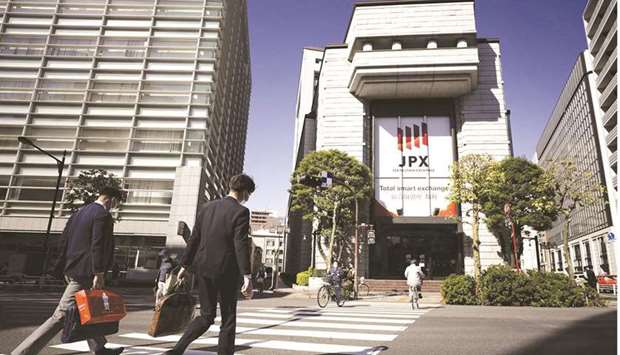Asian and European markets were mixed on Wednesday as investors assess the impact of the fast-spreading Delta variant and the future of Federal Reserve financial support against expectations that the global economy will eventually recover from the pandemic crisis.
News that US President Joe Biden’s $1.2tn infrastructure spending bill had finally passed the Senate provided some cheer, though analysts said it would likely be some time before it gets through the House owing to differences among Democrats.
Equities have had a largely positive start to the week after a recent run of pressure caused by profit-taking — many markets were sitting around record or multi-year highs — and concerns about China’s crackdown on sectors including tech and private tuition.
But the key driver of unease has been the surge in new infections of the Delta Covid mutation, which has forced a number of governments around the world to reimpose lockdowns and other containment measures.
While the new case rates are rising in places with struggling vaccination programmes, spikes in countries with high inoculation rates such as Israel, the United States and Britain are also seeing it spread.
Still, investors remain by and large upbeat that the world economy will eventually ride the disease out, even if it does take the recovery longer than initially hoped.
“There’s clearly more focus and concern on the Delta variant of Covid, but, to this point, markets have appraised that as a manageable risk,” David Donabedian, of CIBC Private Wealth Management, said. “The market is climbing the wall of worry.”
Tokyo, Hong Kong, Shanghai, Sydney and Manila rose but Singapore, Seoul, Wellington, Taipei, Mumbai and Bangkok fell.
That came after the Dow and S&P 500 ended at new record highs.
Eyes are firmly on the release later in the day of US July inflation data, which could have a bearing on the Fed’s decision on when to start tapering the vast bond-buying programme that has been a major pillar of support for global markets since April last year. Soaring prices in recent months and blockbuster jobs creation in June and July have ramped up pressure on the bank to tighten policy in order to prevent the economy from overheating.
And with several officials indicating their support for a tightening before year’s end, the question now is when — not if — it will move, leaving observers to suggest an interest rate hike as early as 2022.
“While the Fed may well still be able to argue the continued rise in prices is transitory... if June’s number doesn’t mark the high-water mark, then Fed officials may start to shift a little bit more uncomfortably as we head into the autumn,” said CMC Markets analyst Michael Hewson.
“However, whatever happens this week the direction of travel towards a taper seems a little more straightforward than it was a couple of months ago, given recent jobs data.” Expectations for a further fresh financial boost from Biden’s new infrastructure bill are tepid, despite it enjoying rare bipartisan passage through the Senate on Tuesday.
The programme — which includes $550bn in new spending — must now make its way through the House before being signed off by the president.
But the House has signalled it will not pass unless senators also push through a $3.5tn package for social spending that includes tax increases — a demand Republicans and even some Democrats are unlikely to agree to.
“The big uncertainty is if the partisan budget resolution is chopped down too much, will progressives refuse to hold up all infrastructure legislation,” said OANDA’s Edward Moya.
In Tokyo, the Nikkei 225 closed up 0.7% to 28,707.51 points; Hong Kong — Hang Seng Index ended up 0.2% to 26,660.16 points and Shanghai — Composite closed up 0.1% to 3,532.62 points yesterday.

Pedestrians cross a road in front of the Tokyo Stock Exchange. The Nikkei 225 closed up 0.7% to 28,707.51 points yesterday.
